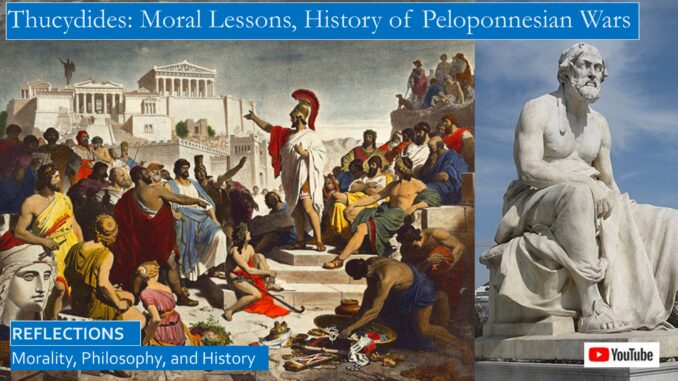
All the ancient historians we have studied so far, Herodotus, Thucydides, and Plutarch, all seek out the moral lessons of history, so we can apply these lessons to our current day. We have selected three famous conflicts that Thucydides reflects on more for the moral lessons they teach than for their effect on history. All three incidents occurred in the mid-point of the Peloponnesian Wars after the death of Pericles.
REVOLT OF THE ATHENIAN ALLY, MYTILENE OF LESBOS
In the account of the revolt of Mytilene, and in the memorable speeches of the Athenian Assembly, Thucydides ponders the nature of the Athenian Empire, and the attitudes of ordinary Athenians towards their empire.
YouTube video for this blog: https://youtu.be/yECl8cKCzao
YouTube script with more book links: https://www.slideshare.net/BruceStrom1/thucydides-moral-lessons-drawn-from-histories-of-the-peloponnesian-war
Link to view complete series of blogs on the Peloponnesian Wars:
https://seekingvirtueandwisdom.com/category/peloponnesian-wars/
Link to view complete series of videos on the Peloponnesian Wars:
https://www.youtube.com/watch?v=szi7-9QQWI0&list=PLJVlY2bjK8lg2pivnGN3m13VI8YstKs0T
Many of the city-states in the Delian League wondered, why do we need to continue to pay tribute to Athens now that the threat from Persia has been removed? Did we trade one tyrant state for another? But a quick look at the map reveals that Mytilene is on the island of Lesbos, which is very close to the straits of the Dardanelles, guarding access to the colonies on the Black Sea, which provide the grain that Athens depends on to feed its populace. The city-state of Mytilene plotted to rebel against Athens, but the Athenians were informed by the smaller city-states on the island of Lesbos who feared that Mytilene would seek to dominate the whole island.
The Athenians had blockaded Mytilene, while the Spartans sent a commander, Salaethus, to direct them in the battle, and sent a fleet of forty ships which tarried in their long voyage around the Peloponnese. But the Mytilenians were anxious, their food was running out, the Spartan ships were nowhere to be seen, the people balked at facing the Athenian hoplites in battle. The people demanded that the food stores be shared among all, they suspected the aristocrats were hoarding the food, which was likely true.
Fearing insurrection, the aristocrats to surrendered the city under these terms to the Athenians: the Athenian army could enter the city; the Mytilenians would send ambassadors to Athens to plead their case, and in the interim, the Athenian commander Paches would not harm, imprison, or enslave the population.[1] We have seen several occasions where city-state representatives were permitted to address the assemblies of their enemies, which is an interesting feature of the Greek assemblies.
Thucydides tells us, “Cleon was responsible for passing the original motion to put” to death the rebels and “the entire male population of Mytilene, and also to enslave the women and children.” The Athenian Assembly was outraged because Mytilene was an allied rather than a subject state who had appealed for assistance to Sparta, who actually sent their fleet to assist them, so the Assembly voted to approve the suggestion of Cleon, sending a trireme to Mytilene to instruct Paches “to put the Mytilenians to death immediately.”
Thucydides then tells us that “the next day there was a sudden change of feeling and people began to think how cruel and how unprecedented such a decision was, to destroy not on the guilty, but the entire population of a state.”
And Thucydides has long speeches we excerpt, where we learn how the Athenians justified their empire to themselves. He had Cleon addressing the Assembly, “Personally I have had occasion often enough already to observe that a democracy is incapable of governing others, and I am all the more convinced of this when I see how you are now changing your minds about the Mytilenians.” “I urge you not to be traitors to your own selves.” It is really rich that Cleon is trying to behave like Pericles, admonishing the Assembly, but they do not always have the same degree of confidence in his words.
Cleon continues with a thought that Thucydides no doubt agrees with, “What you do not realize is that your empire is a tyranny exercised over subjects who do not like it and who are always plotting against you; you will not make them obey you by injuring your own interests in order to do them a favor; your leadership depends on superior strength and not on any goodwill of theirs.” Cleon’s logic is truly Machiavellian; he later concludes, “If they were justified in revolting, then you must be wrong in holding power. If, however, whatever the rights or wrongs of it may be, you propose to hold power all the same, then your interest demands that these, too, rightly or wrongly, must be punished. The only alternative is to surrender your empire, so that you can afford to go in for philanthropy.” “Punish them as they deserve and make an example of them to your other allies, plainly showing that revolt will be punished by death.”
Thucydides has Diodotus counter the arguments of Cleon, this is the only mention of Diodotus in the account of Thucydides, his existence is otherwise forgotten in the sands of history. It is significant that Cleon loses this argument to someone so obscure. What are the moral lessons Diodotus teaches us? He opens his speech, “I do not share the view that it is a bad thing to have frequent discussions on matters of importance. Haste and anger are the two greatest obstacles to wise counsel. Haste is paired with folly, and anger is the mark of primitive and narrow minds.”
Then Diodotus takes aim at the motives of Cleon: “Anyone who maintains that words cannot be a guide to action must either be a fool or have a personal interest at stake. He is a fool if he imagines that it is possible to deal with uncertainties any other way. He is personally interested if his aim is to persuade you into some disgraceful action and knowing that he cannot make a good speech in a bad cause, he tries to frighten his opponents and his hearers by some good sounding misrepresentations.”
Then he turns the arguments of Cleon on its head, that whether the Mytilenians are guilty or innocent, whether they should be harshly punished or not, is not nearly as important as the morally ambivalent question of what course of action is in the best interests of Athens. Diodotus asks the Assembly: “Consider this now, if a city has revolted and realizes that the revolt cannot succeed, it will come to terms while it is still capable of paying an indemnity and continuing to pay tribute afterwards. But if Cleon’s method is adopted, can you not see that every city will not only make much more careful preparations for revolt, but will also hold out against siege to the very end, since to surrender early or late” brings on them the same punishment? “This is unquestionably against our best interest, to spend money on a siege because of the impossibility of coming to terms, and, if we capture the place, to take over a city that is in ruins so that we lose the future revenue from it. And it is on this revenue that our strength in war depends.”
Diodotus continues, “The right way to deal with a free people is this: not to inflict tremendous punishments on them after they revolted, but to take tremendous care of them before this point is reached, to prevent them even contemplating the thought of revolt, and, if we do have to use force with them, to hold as few as possible of them responsible for the revolt.”
The Assembly voted to reverse their decision of the prior day, we will lose the drama unless we let Thucydides tell the tale: “Immediately another trireme was sent out in all haste,” the first trireme had a day’s head start. “The ambassadors from Mytilene provided wine and barley for the crew and promised great rewards if they arrived in time,” so the rowers ate while they rowed continually, napping in shifts, not eating their meals on the beaches as was usually done. “Luckily, they had no wind against them. The first ship was not hurrying on its distasteful mission, while the second trireme were pressing on with great speed. Soon after the first ship arrived, with Paches reading the decree, preparing to enforce it, the second ship put into harbor and prevented the massacre. So narrow had been the escape of Mytilene.”
About a thousand Mytilenians involved in the revolt were executed, their fortifications were destroyed, their navy was seized, Athenian shareholders were installed on seized land, and the entire island of Lesbos became subjects of Athens. These punishments were harsh, but the people of Mytilene were spared, they were neither executed nor enslaved.[2] They could continue to live and prosper as free men.
REVOLUTIONS SPARKED AT CORCYRA
Thucydides reports that the revolution at Corcyra was put into motion with prisoners of war released by the Corinthians, these returning Corcyran soldiers sought to overthrow the radical democracy instituted by Athens. They first brought litigation against Peithias, leader of the radical democrats, after the suit was dismissed, they broke into a meeting of the Council and stabbed to death Peithias and sixty other officials and bystanders. Of course, a delegation informed the Athenian Assembly of these unfortunate events.
The radical democrats who sided with Athens seized the central district of the city; the aristocrats who sided with Sparta seized the acropolis. Both sides offered slaves their freedom for enlisting, most slaves sides with the democrats. Thucydides said that “the women also joined in the fighting with great daring, hurling down tiles from the roof-tops and standing up to the din of battle with a courage beyond their sex.” By sunset the aristocrats were in full retreat, “they set fire to the houses and apartments around the town square,” “sparing neither their own property nor that of others, and, if a wind had risen and fanned the flames, the whole city might well have been destroyed.”
Athenian triremes arrived to assist the Corcyran triremes, Spartan triremes arrived, and all three engaged in a naval battle; the Spartans eventually retreated. Likely hundreds of members of the rebellion were slain by the democrats, adding to the mayhem, as Thucydides puts it, “the victims were accused of conspiring to overthrow the government, but in fact men were often killed on grounds of personal hatred or else by debtors because of the money they owed.”
Thucydides states the war led to revolutions and civil wars in many city-states, just as our World Wars I and II led to revolution, overthrow of monarchies, and decolonization. Thucydides states, “practically the whole of the Hellenic world was convulsed, with rival parties in every state. Democratic leaders trying to bring in the Athenians, and oligarchs trying to bring in the Spartans.” In peacetime this would not have happened, “but in time of war, when each party could always count upon an alliance which would do harm to its opponents and at the same time strengthen its position, it became natural for anyone who wanted a change of government to call in help from outside.”
Thucydides offers a warning for us today on the dangers of civil strife: “Fanatical enthusiasm was the mark of a real man, and to plot against an enemy behind his back was perfectly legitimate self-defense. Anyone who held violent opinions could always be trusted, and anyone who objected to them became a suspect.” “Family relations were a weaker tie than party membership, since party members were more ready to go to any extreme for any reason whatever.” “As a result of these revolutions, there was a general deterioration of character throughout the Greek world.”[3]
MELIAN DIALOGUE
Thucydides here tells us about a minor military engagement that illustrates how the Athenians were guilty of the primary fault in a warrior culture, the fault of hubris, the overweening arrogance that leads to the bad fortune that snatches defeat from the jaws of victory. Melos was a Spartan island colony in the Southern Aegean Sea, roughly equidistant from Attica and the Peloponnese.
The Athenians sent representatives to demand the surrender of the Melians, the Melians refuse to allow them to address the Assembly, but rather bade them address the leadership. The Athenians mince no words, make no moral justifications, but rather say that in war, might makes right. These are excerpts from their long speech in Thucydides:
“Athenians: We will use no fine phrases saying that we have a right to our empire because we defeated the Persians, or that we have come against you because of what you have done to us, a great mass of words that nobody would believe.” Neither would a protest that you have not aided Sparta in this war do you any good. “When matters are discussed by practical people, the standard of justice depends on the equality of power to compel and that in fact the strong do what they have to power to do and the week accept what they have to accept.”
“Melians: How could it be just as good for us to be your slaves as for you to be our masters?
Athenians: You, by giving in, would save yourselves from disaster; we, by not destroying you, would be able to profit from you.”
The Melians, though so far outnumbered that they cannot seek kleos, or glory, in combat, nevertheless seek to avoid shame: “We who are still free would show ourselves great cowards and weaklings if we failed to face everything that comes rather than submit to slavery.
Athenians: This is no fair fight, with honor on one side and shame on the other. It is rather a question of saving your lives and not resisting those who are far too strong for you.”
The Athenians do not feel bound by a greater good, nor do they fear the judgement of the gods. “Our opinion of the gods and our knowledge of men lead us to conclude that it is a general and necessary law of nature to rule whatever one can.”
Thucydides dryly shares their bitter end, “Siege operations were carried out vigorously, with some treachery, and the Melians surrendered unconditionally to the Athenians, who put to death all the men of military age and sold the women and children as slaves.”[4]
The revolt of Mytilene occurred early in the war, in 428 BC, when the Athenians were more lenient. As the war became more bitter, both sides committed atrocities, the Melian debate and siege occurred in 416 BC, a few years before the Athenian defeat in Sicily. Even so, the brutality of the Melian massacre was shocking for many Greeks, including many Athenians.[5]
In his history of the War, Xenophon mentions Melos when he tells of the terror the Athenians felt when news first came that their fleet had been destroyed, and that Athens was now defenseless from the fleet commanded by the Spartan general Lysander. Xenophon tells us the worries of the Athenians, “As new of the disaster was told, one man passed it on to another, and a sound of wailing arose, first from the Piraeus,” the port of Athens, “then all along the Long Walls until it reached the city. That night no one slept. They mourned for the lost, but more still for their own fate. They thought that they themselves would now be dealt with as they had dealt with others, with the Melians, colonists of Sparta, after they had besieged and conquered Melos,” and he then lists several other atrocities the Athenians regretted committing.[6]
[1] Thucydides, History of the Peloponnesian War, translated by Rex Warner (London, Penguin Classics, 1972, 1954, originally after 410 BC), Introduction, Book 3.26-28, pp. 206-208.
[2] Thucydides, History of the Peloponnesian War, Book 3.37-50, pp. 213-223.
[3] Thucydides, History of the Peloponnesian War, Book 3.69-83, pp. 236-244.
[4] Thucydides, History of the Peloponnesian War, Book 5.84-116, pp. 400-408.
[5] https://en.wikipedia.org/wiki/Siege_of_Melos
[6] Xenophon, Hellenica, A History of Our Times, translated by Rex Warner (New York: Penguin Classics, 1979, 1966, originally after 362 BC), Book 2.2.3, p. 104.

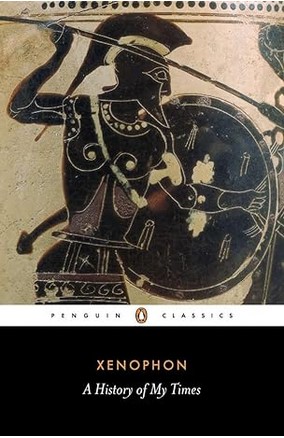
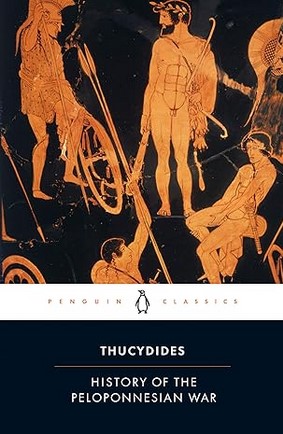
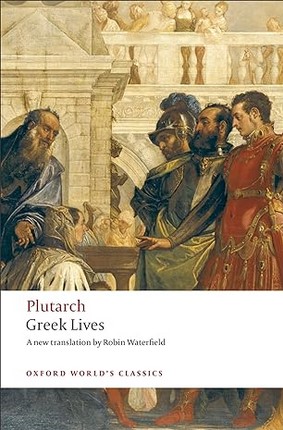

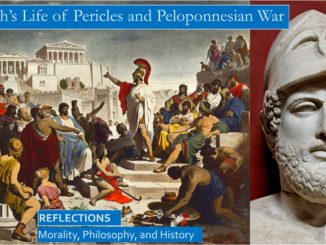

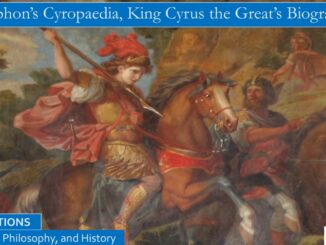
Be the first to comment